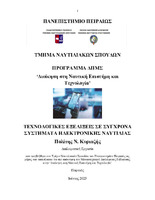Τεχνολογικές εξελίξεις σε σύγχρονα συστήματα ηλεκτρονικής ναυτιλίας

Προβολή/
Λέξεις κλειδιά
Net-centric ; e-Navigation ; Big data ; CybersecurityΠερίληψη
Αναμφισβήτητα ο τομέας της ναυτιλίας αποτελεί ακόμα και σήμερα ένα από τους κορυφαίους τομείς ανάπτυξης της Ελλάδας, καθώς και ένας από τους σημαντικότερους πυλώνες της ελληνικής οικονομίας. Βασικό στοιχείο του κλάδου, είναι η αθρόα χρήση νέων τεχνολογιών, με σκοπό την διατήρηση / επαύξηση της ανταγωνιστικότητας και των κερδών. Η ναυτιλιακή βιομηχανία, με ένα διαρκώς αυξανόμενο αριθμό αγαθών να διακινούνται από την μια μεριά του κόσμου στην άλλη, τείνει στην ψηφιοποίηση. Στην παρούσα εργασία επιχειρείται να μελετηθεί το πλήθος των τεχνολογικών εξελίξεων, οι οποίες είναι προσβάσιμες στην αγορά, και οι οποίες υπό συγκεκριμένες προϋποθέσεις, συμβάλουν στην επαύξηση της ασφάλειας και της ποιότητας στην ναυτιλία. Ωστόσο, λόγω της διαρκούς τεχνολογικής προόδου, οι εξελίξεις είναι ραγδαίες και νέα προϊόντα, νέα λειτουργικά, προστίθενται στην αγορά, η οποία είναι ιδιαίτερα δυναμική και ανταγωνιστική. Στα πλαίσια εναρμόνισης με τις επιταγές του ΙΜΟ σχετικά με την χρήση ηλεκτρονικών συστημάτων, για την καλύτερη και ασφαλέστερη πλεύση των πλοίων, ήδη από τις αρχές της δεκαετίας του 1970, ο κλάδος της Ηλεκτρονικής Ναυτιλίας αποτελεί χαρακτηριστικό παράδειγμα της νέας τάσης των εταιρειών, είτε ναυτιλιακών είτε εταιρειών που υποστηρίζουν την ναυτιλία.
Σκοπός αυτής της πτυχιακής εργασίας είναι η παρουσίαση των συστημάτων και εφαρμογών αυτών που υποστηρίζουν όχι μόνο τα πλοία εν πλω, αλλά και τις καθημερινές εργασίες και της εταιρείας στην ξηρά. Τα συστήματα αυτά που βασίζονται κατά κύριο λόγο στην ευρεία εφαρμογή και ανάπτυξη του διαδικτύου αλλά και των ασύρματων κινητών επικοινωνιών, παρουσιάζει διαρκή ανάπτυξη και εξέλιξη, μιας και η τεχνολογία εξελίσσεται ραγδαία. Δεν αποτελεί άλλωστε τυχαίο το γεγονός ότι η πλειοψηφία των μεγάλων ναυτιλιακών εταιρειών , πλέον, αναπτύσσει ξεχωριστά τμήματα (IT) τεχνολογίας (ΤΠΕ) με σκοπό την ανάπτυξη λογισμικού για την υποστήριξη όχι μόνο των καθημερινών της εργασιών αλλά και για την προώθηση της ασφάλειας επί των πλοίων. Αυτή η εξέλιξη ωστόσο , δημιουργεί καινούργιες προκλήσεις στον άγνωστο μέχρι τώρα χώρο της ασφάλειας στον κυβερνοχώρο. Γεννάται επομένως μια νέα έννοια η λεγόμενη πειρατεία στον κυβερνοχώρο (cyber hasking).
Κατά συνέπεια στο 1ο κεφάλαιο θα αναφερθεί η έννοια της Net Centric επιχείρησης. Θα αναφερθούν στοιχεία που αφορούν την αρχιτεκτονική και την τελική χρήση της δικτυοκεντρικής οργάνωσης επί του πλοίου καθώς και το περιβάλλον συνεργασίας με την εταιρεία στην ξηρά. Στο 2ο κεφάλαιο αναλύεται η έννοια της ηλεκτρονικής Ναυτιλίας, ενώ γίνεται αναφορά στα συστήματα και τεχνολογίες Πληροφοριών και Επικοινωνιών στις Ναυτιλιακές Επιχειρήσεις (ITCs). Στο 3ο κεφάλαιο αναφέρονται τα συστήματα ηλεκτρονικής ναυτιλίας που βρίσκονται εγκατεστημένα επί των πλοίων, αναφέρονται νέες τεχνολογίες, αλλά και επισημαίνονται τυχόν εξελίξεις επί των ήδη παραδοσιακών ναυτιλιακών συσκευών. Στο 4ο κεφάλαιο γίνεται προσπάθεια να περιγραφούν τα συστήματα ηλεκτρονικής ναυτιλίας που βρίσκουν εφαρμογή επί των ναυτιλιακών εταιρειών στην ξηρά, μέσω των οποίων επιτυγχάνεται συνεργασία και διαρκής επικοινωνία με το πλοίο εν πλω. Τέλος στο 5ο κεφάλαιο, επιχειρείται μια προσέγγιση σε έναν από τους μεγαλύτερους κινδύνους που αντιμετωπίζουν εφεξής όλες οι εταιρείες συμπεριλαμβανομένου των ναυτιλιακών, και αφορά τις κυβερνοεπιθέσεις.


